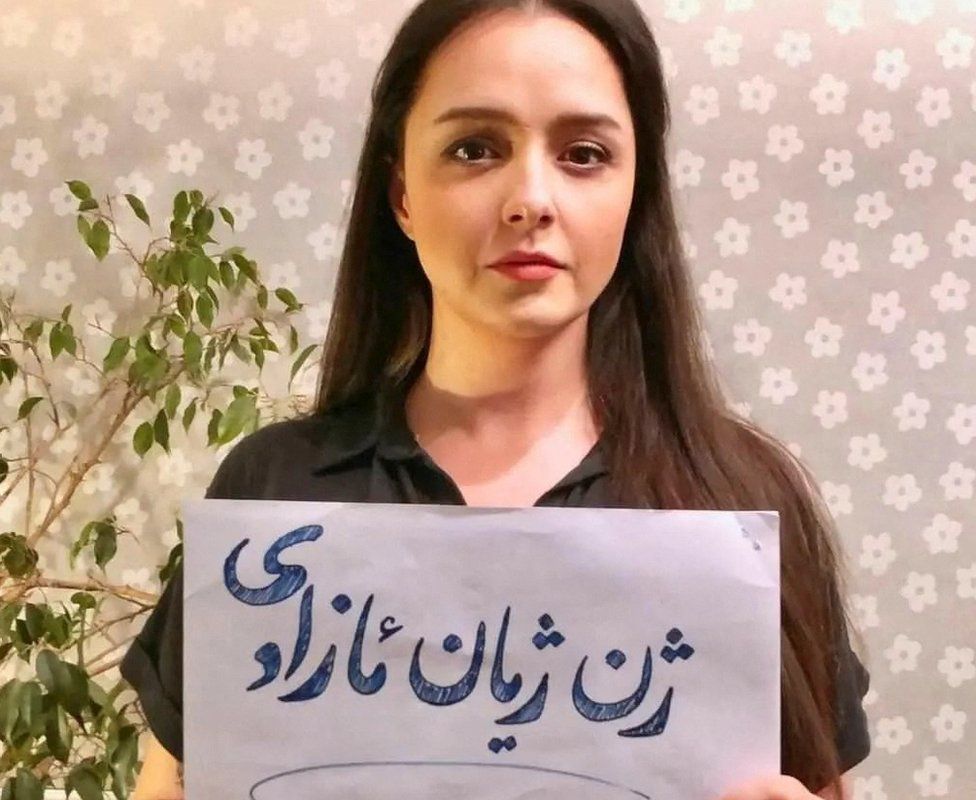
Taraneh Alidoosti was detained after posting a photo of herself without a headscarf and holding a sign bearing the protest slogan: “Woman, life, freedom”
By Parham Ghobadi
BBC Persian
Iran formed a secret committee last year to punish celebrities who backed the current anti-government protests, leaked documents seen by the BBC show.
In a letter dated 22 September, just six days after the unrest began, the committee sent the economy ministry a list of 141 well-known figures.
It told the ministry to investigate their tax returns and take unspecified action against them.
The list included football legend Ali Daei and top actress Taraneh Alidoosti.
They are among dozens of artists, sportspeople and social media influencers who have faced economic sanctions, travel bans or detention over the past seven months after supporting the protesters’ calls for basic freedoms.
Demonstrations spread rapidly across the country following the death in custody on 16 September of Mahsa Amini, a young woman who was detained by morality police in Tehran for allegedly wearing her hijab “improperly”.
Hundreds of people have died and thousands more have been detained in a violent crackdown by security forces, which have portrayed the protests as foreign-instigated “riots”.
BBC Persian obtained three documents through a Middle Eastern intelligence source that reveal how the government took swift and co-ordinated action in an attempt to deter celebrities from not following the official line.
The letter dated 22 September announces decisions by a so-called “Celebrity Task Force” and identifies its chairman as the Minister of Culture and Islamic Guidance, Mohammad Mehdi Esmaili, who has been sanctioned by the European Union for allegedly committing serious human rights violations.
It says the economy ministry has been instructed to look at the tax returns of 141 well-known figures perceived by the committee to have played an important role in fuelling the unrest and to implement “anticipated restrictions according to the law”.
As well as Ali Daei and Taraneh Alidoosti, who was arrested on 17 December after condemning the execution of a protester and released on bail two weeks later, the celebrities on the list included filmmakers Asghar Farhadi, Pegah Ahangarani, Manijeh Hekmat, Barzou Arjomand and Shahin Samadpour, and former TV host Ehsan Karami.
Image source, Getty Images
Oscar-winning filmmaker Asghar Farhadi has not returned to Iran since the protests erupted last year
The letter does not give details about the “restrictions” they faced, but one of those named told BBC Persian: “Instagram influencers were threatened by officials that if they continued to support the protests they would have to pay taxes on all the income they receive from their online activities, which would amount to a significant sum.”
Two other individuals confirmed that their bank accounts were blocked after they expressed support for the protests.
Another document, marked as “top secret” and dated 26 September, says that the “Celebrity Task Force” has been renamed the “Celebrities Committee” and made permanent.
It also says that the committee’s responsibilities have been divided, with the culture and intelligence ministry dealing with “artists, singers and media personalities”, and the sports ministry and Revolutionary Guards’ intelligence agency taking over sportspeople.
The document warns that any decision regarding the celebrities “should be made in a way that minimises costs and maximises benefits in controlling disturbances and supporting the principles of the regime”.
The third document, dated 1 November, discusses how to deal with footballers ahead of the World Cup in Qatar and says the assets of a well-known player and coach should be frozen.
The document also says the committee has been angered by the “continuous audacity” of the actress Fatemeh Motamed-Arya and that it has asked the Tehran prosecutor’s office to “quickly indict her and put her case on the agenda with priority”.
Ms Motamed-Arya had posted photos of herself without a hijab and released a strongly-worded video complaining about being featured in a government billboard showing hijab-wearing women.
And despite their supposed focus on sportspeople, the document says Revolutionary Guards’ intelligence agents have been given permission to detain the actress Katayoun Riahi.
Ms Riahi, one of the first actresses to remove her hijab in support of the protests, was reportedly arrested near the northern city of Qazvin on 20 November and released on bail a week later.

